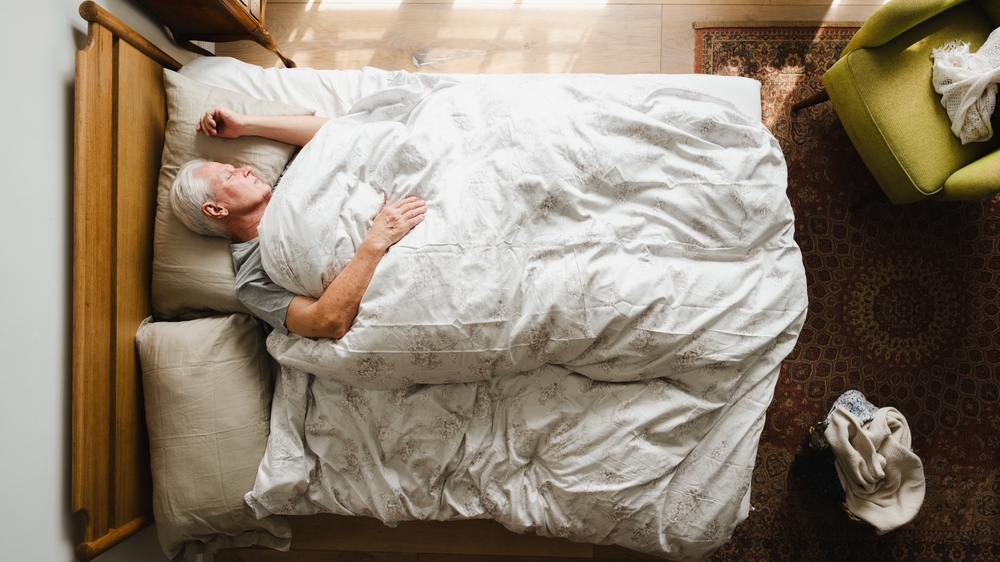
Many men over 55 struggle to get quality rest, often turning to quick fixes for relief. The problem is that some of these quick fixes can make things worse. Sleep changes with age—hormones shift, metabolism slows, and recovery takes longer. Using the wrong sleep aid can lead to grogginess, dependency, or even health risks. Understanding which sleep aids for men over 55 backfire can help protect both rest and long-term well-being.
1. Over-the-Counter Antihistamines
Many nighttime pain relievers and “PM” formulas rely on antihistamines like diphenhydramine or doxylamine. They can make you drowsy, but the effect often fades after a few nights. For men over 55, these drugs can linger in the system, leading to morning grogginess, confusion, or dizziness. That increases the risk of falls and accidents.
Regular use can also create tolerance. You may need more to get the same effect, which can worsen side effects. Instead of better rest, you end up with fragmented sleep and a fuzzy head the next day. If allergies or congestion are the issue, targeted daytime treatments are safer than relying on sedating antihistamines at night.
2. Alcohol as a Nightcap
It’s common to think that a drink before bed helps you relax. While alcohol can make you sleepy fast, it disrupts deep sleep and REM cycles later in the night. That leads to frequent waking, dehydration, and poor-quality rest. For men over 55, the body processes alcohol more slowly, amplifying these effects.
Alcohol also worsens snoring and sleep apnea—two issues that become more common with age. Even small amounts can interfere with medications for blood pressure or diabetes. Cutting back on nightcaps may be one of the simplest ways to improve natural sleep without relying on risky sleep aids.
3. Melatonin Supplements
Melatonin is a hormone that regulates sleep-wake cycles, and supplements can help with jet lag or shift work. But for older men, taking too much or taking it at the wrong time can throw off the body’s rhythm. The dose in many over-the-counter products is far higher than what the body naturally produces.
Long-term use of melatonin may also blunt the body’s own production. Some users report experiencing vivid dreams or feeling groggy the next day. If you decide to use it, start with the smallest dose possible—typically 0.3 mg to 1 mg—and take it approximately one hour before bedtime. Treat it as a short-term tool, not a nightly habit.
4. Prescription Sedatives and “Z-Drugs”
Doctors sometimes prescribe drugs like zolpidem or eszopiclone to treat insomnia. These medications can provide short-term relief, but they also carry risks. Older adults are more sensitive to their effects, which can include confusion, balance problems, and even sleepwalking. The next-day drowsiness can be subtle but dangerous, especially when driving or using machinery.
Dependence can form quickly. Once the body adapts, stopping the drug can cause rebound insomnia—making sleep even harder. For men over 55, the safest path is to use these medications sparingly and under close supervision, focusing instead on habits that promote natural rest.
5. Herbal Teas and “Natural” Blends
Chamomile, valerian, and passionflower teas are marketed as gentle alternatives. While they seem harmless, herbal sleep aids can still interact with medications for blood pressure, cholesterol, or prostate health. Some blends contain multiple herbs that haven’t been tested together, making it hard to predict side effects.
Because supplements are loosely regulated, potency can vary widely between brands. Men who take blood thinners or heart medication should be especially cautious. Even natural remedies can backfire if they disturb normal sleep architecture or cause unexpected reactions. Always check with a healthcare provider before adding new supplements to your nightly routine.
6. CBD and Cannabis Products
CBD oils and gummies have gained popularity as sleep aids. Some men find them calming, but the science is still mixed. Quality and dosage vary widely, and older adults metabolize cannabinoids differently. For men over 55, this can mean unpredictable effects—sometimes relaxation, other times agitation, or next-day fatigue.
CBD can also interact with medications processed by the liver. While it may help some people unwind, it’s not a guaranteed fix. Using sleep aids for men over 55 that aren’t well-regulated adds uncertainty, especially when combined with other prescriptions. If you try CBD, choose products with verified lab reports and start at very low doses.
Better Sleep Starts With Simpler Choices
Most sleep problems after 55 stem from lifestyle and health changes, not a lack of pills or potions. A consistent bedtime, limited caffeine, and a cool, dark room can do more than many commercial products. Gentle exercise, exposure to morning light, and relaxation routines all support better rest without adding risk.
Before considering sleep aids for men over 55, it is helpful to review medications and daily habits with a doctor or pharmacist. Addressing pain, stress, or medical issues often improves sleep naturally. For more on healthy habits that support rest, the Sleep Foundation and CDC Sleep and Sleep Disorders pages offer clear, science-based guidance.
What sleep strategies have worked—or not worked—for you after 55? Share your experience in the comments below.
What to Read Next…
- Why Parents Need to Practice Good Sleep Hygiene
- Tired All the Time 5 Ways You’re Secretly Ruining Your Sleep
- Stop Doing These 6 Things Before Bed They’re Ruining Your Sleep
- Clear Busy Mind
- How to Find Time to Exercise
The post 6 Common Sleep Aids That Backfire on Men After 55 appeared first on Budget and the Bees.







